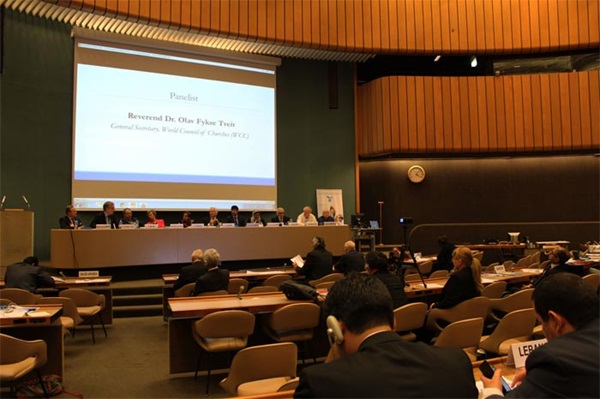Linked to the 34th session of the Human Rights Council, the Geneva Centre for Human Rights Advancement and Global Dialogue organized a side event on 15 March exploring "Islam and Christianity, the Great Convergence: Working jointly towards equal citizenship rights" at the United Nations offices in Geneva. World Council of Churches general secretary Rev. Dr Olav Fykse Tveit was among the panelists.
World Council of Churches is one of the ecumenical partners supported by the Interdenominational Cooperation Fund which enables United Methodists to share a presence and a voice in the activities of several national and worldwide ecumenical organizations.
The goal of the center's initiative was to highlight the common ground that exists between Islam and Christianity, and what this might mean for the question of citizenship, especially in Muslim majority countries. Ten speakers discussed the possibility of a "great convergence" between these two religions, which are committed to peace for all and yet, still generate misunderstandings, disagreement and even wars. Each panelist gave a short update on the situation of his or her country on violence against Muslims and Christians.
Many speeches focused on the importance of emphasizing the similarities of these religions - one God, spiritual
growth, respect towards the neighbors - but they also noted that some religious communities still face discrimination. Rev. Timothy Radcliffe, Dominican friar of the English Province, said: "Strangers are feared because of the difference of their religion, their ethnicity and their culture".
Speakers explored the question of how to ensure the equal citizenship of both Muslims and Christians. Many case studies and proposals were shared by both the panel and the audience. "The affirmation of group rights, associated with an unfair political representation for all citizens, reinforced majority-minority divisions and mutual perceptions" shared His Excellency minister Tarek Mitri, former acting minister of Foreign Affairs of Lebanon, director of the Issam Fares Institute for Public Policy and International Affairs (IFI) and a former staff member of the WCC.
Her Excellency ambassador Marie-Thérèse Pictet-Althann, permanent observer of the Sovereign Order of Malta to the UN, said: "In order to strengthen equal citizenship rights, it is essential that minorities fully participate in the activities and decision making process of their communities so as to avoid becoming a sub-group and thus being marginalized which in turn jeopardizes social harmony."
The equality of citizenship for Muslims and Christians is part of the peace process for the good of the "one humanity" mentioned by Tveit in his address.
Loyola Ranarison, communication officer for the World Council of Churches.
One of seven apportioned giving opportunities of The United Methodist Church, the Interdenominational Cooperation Fund enables United Methodists to share a presence and a voice in the activities of several national and worldwide ecumenical organizations. Please encourage your leaders and congregations to support the Interdenominational Cooperation Fund apportionment at 100 percent.





